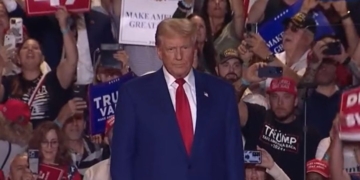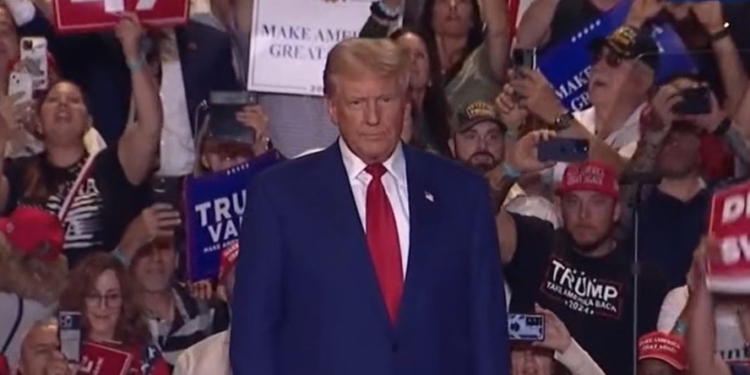President-elect Donald Trump will have to deal with another volatile situation in Syria as a new faction toppled Syrian President Bashar al-Assad’s 24-year regime, setting the stage for another potentially protracted conflict.
The al-Assad dictatorship came crashing down Saturday after rebels led by Islamic group Hayat Tahrir al-Sham (HTS) seized Syria’s capital in Damascus, bringing a bloody conflict to a close that has raged since 2011. However, the potential for conflicts among other rebel factions mixed in with Israeli, Russian and U.S. operations in the country creates a precarious situation that could ignite at any moment, presenting the incoming Trump-Vance administration with a major foreign policy challenge on day one.
“It’s a wickedly complex situation that definitely has a lot of U.S. interest,” Brent Sadler, senior research fellow for the Allison Center for National Security at the Heritage Foundation, told the Daily Caller News Foundation. “I think that’s the first thing to acknowledge upfront is [that] it doesn’t necessarily mean we have to be more militarily engaged than we are already, but at the same time signaling readiness to reward those that share our interests and values, and to punish those who don’t. It’s the early days, quite frankly, to know exactly how the power situation is going to play out in Syria.”
HTS was designated by the U.S. as a foreign terrorist organization in 2018 under the Trump administration, according to the Office of the Director of National Intelligence. The group first organized in 2017 when the former leader of al-Qaeda’s Syrian branch, Abu Muhammad al-Jawlani, split with the organization over strategic differences.
Al-Jawlani was formerly detained by U.S. forces during the invasion of Iraq, being let out in 2011, according to The Wall Street Journal. Al-Jawlani reportedly expressed a moderate position on minorities like Christians staying in their country, however some are still anxious as to what he may ultimately end up doing on the matter.
“At some point back in 2018 to 2019, al-Jawlani makes a break from the ideology of ISIS and certainly al-Qaeda, because I think he realized there is no way to unify the Syrian people to topple Assad’s regime without moderating their very radical Salafist ideology,” Sadler told the DCNF. “They’re still Islamist, but I think they’re trying to moderate themselves for very pragmatic reasons.”
The two most influential factions other than HTS include the U.S.-backed Kurdish Syrian Defense Force (SDF) and the Turkish-backed Syrian National Army (SNA).
The SNA formed in 2017 out of various rebel groups in northern Syria to oppose the Assad regime and HTS, according to Middle East Eye. However, SNA joined the most recent offensive alongside HTS after the group took the city of Aleppo, according to Reuters.
The SNA are also currently fighting the SDF as well in the wake of Assad’s collapse, according to the Foundation for Defense of Democracies (FDD) Tuesday.
With HTS’ ascendancy adding profound uncertainty to the region, Trump stated in a post on Truth Social Saturday that he wants the U.S. to stay uninvolved in Syria, saying there was not much to gain for the U.S. in direct involvement at this time.
“What the Trump administration needs to think about is, ‘where in this does U.S. interest lie? How do we influence what’s happening there to our advantage?’” Simone Ledeen, former deputy assistant secretary of defense for the Middle East, told the DCNF. “Also, it’s important to note we have troops on the ground in Syria, and they’ve been taking fire for the last four years. What’s our desired strategic end-state in Syria? What do we need them to accomplish, besides taking fire from Iranian proxies?”
The U.S. operates al-Tanf military base in southern Syria, which has also served as the headquarters for operations against ISIS since 2016, according to the Council on Foreign Relations. During Assad’s rule, the U.S. operated the base against his will.
Currently, the U.S. has 900 troops stationed in Syria, according to the Pentagon. Trump, who ran on ending “forever wars,” attempted to withdraw troops from Syria in 2018 but faced enormous pushback from foreign policy hawks of both parties. Ultimately, the U.S. retained some troops in the nation mainly for anti-ISIS operations, according to Politico.
Israel has taken advantage of the power vacuum, seizing strategically vital areas in the Golan Heights region in southern Syria, according to The Washington Post Monday. The newly seized positions put Damascus within Israeli artillery range, Sadler told the DCNF.
The U.S. also conducted strikes on Sunday with Israel against ISIS targets.
In Damascus, the rebels appointed Mohamed al-Bashir, a former HTS opposition government member, as interim prime minister to solidify unity in the rebel front, according to Reuters Tuesday. John Hardie, Russia program deputy director at the FDD, told the DCNF that Trump needs to stay involved enough to work with whoever ends up maintaining power in the region.
“I think the next administration and their allies are really going to have to resist the temptation just to kind of watch from the sidelines,” Hardie told the DCNF. “We’re going to have to play an active role. I think our very small economy-of-force military presence we have in eastern Syria is a good thing for keeping a lid on ISIS. And I would hope that the next administration will kind of work hard with the actors who are coming to power, whatever that new government looks like.”
While Russia’s influence took a massive hit from the fall of Assad, Trump will still have to deal with their remaining pockets of influence while trying to negotiate peace in Ukraine.
Russia’s main chance at influencing the region is through the Alawites living on Syria’s western coast where Tartous Naval Base, Russia’s only port on the Mediterranean Sea, is located. The Alawites were a staunchly pro-Assad faction for most of the civil war, according to Reuters.
“Watch the Russians and watch Latakia,” Sadler told the DCNF. “If the Russians think they have a chance of reconstituting any influence, it’s probably going to be in and around their bases in Latakia. And again, that’s the Alawites, so if there’s any hope of that, that’s where it’s going to be.”
However, Hardie thinks now that Assad is out of the picture, the best hope of the Russians regaining their influence in the region lies in cooperating with the rebels.
“The Kremlin is certainly trying to now play nice with these groups, especially HTS,” Hardie told the DCNF. “You may have seen that just a few days ago, were calling them terrorists, and [Russian Foreign Minister Sergei] Lavrov was sort of chiding journalists for calling them ‘opposition’ rather than ‘terrorists,’ and saying they should never be allowed to. Now they’re saying they will engage with all parties, and the Russian state is calling them ‘armed opposition.’”
Secretary of State Antony Blinken said that he will back a Syrian government that respects minorities, condemns terrorism, bars the use of chemical and biological weapons and supports humanitarian assistance, according to a Tuesday press release.
“We continue to monitor the situation in Syria. President Trump is committed to diminishing threats to peace and stability in the Middle East and to protecting Americans here at home,” Trump-Vance Transition Spokesman Brian Hughes told the DCNF Wednesday.
All content created by the Daily Caller News Foundation, an independent and nonpartisan newswire service, is available without charge to any legitimate news publisher that can provide a large audience. All republished articles must include our logo, our reporter’s byline and their DCNF affiliation. For any questions about our guidelines or partnering with us, please contact [email protected].



























 Continue with Google
Continue with Google